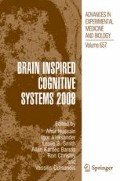Abstract
This chapter presents an agent-based cognitive model aimed to represent human competency concepts and competence management processes of psychological nature. This model is implemented by a multiagent system application intended to help managers of software development projects to select, based on the competence management model, the right professionals to integrate a development team. There are several software engineering methodologies that can be used to design and develop multiagent systems. However, due to the necessity to handle human competency concepts of cognitive nature, like aptitudes, interests, abilities and knowledge, we were driven to choose methodologies that can handle these concepts since the inception of the system. To do so, we integrated the TROPOS methodology, and a set of software engineering methods derived from intelligent tutoring systems research to successfully analyze and design the proposed system. At the end of the paper we present a study case, showing how the proposed system should be applied to the domain of website development.
Access this chapter
Tax calculation will be finalised at checkout
Purchases are for personal use only
References
Bordini, R.H., et al.: JASON and the golden fleece of agent-oriented programming. In: Multi-Agent Programming: Languages, Platforms and Applications, Berlin: Springer, Vol. 15, pp. 3–37 (2005)
Bresciani, P. et al.: Tropos: An agent-oriented software development methodology. In: Autonomous Agents and Multi-Agent Systems, pp. 203–236 (2004)
Carbone, P. et. al.: Gestão por competências e gestão do conhecimento. Rio de Janeiro: FGV, 2 ed., pp. 40–78 (2006)
Dillenbourg, P., Self, J.A: A framework for learner modelling. Interactive Learning Environments, No.2, pp.111–137, (1992)
Dutra, J.: Competências: conceitos e instrumentos para a gestão de pessoas na empresa moderna. São Paulo: Atlas (2004)
Gluz, J.C. et al.: Formal Aspects of Pedagogical Negotiation in AMPLIA System. In: Intelligent Educational Machines. Intelligent Systems Engineering Series. Springer, (2006)
Gluz, J. C. et al.: Pedagogical Negotiation and Solidarity Assimilation Groups in Action: the Combined Efforts of E-M@T and Leibniz to Aid Calculus Students. In: Agent-Based Tutoring Systems by Cognitive and Affective Modeling. IDEA Group, Hershey:PA, USA (2008)
Humphrey, W.S.: A Discipline for Software Engineering – The Complete PSP Book. SEI Series in Software Engineering (2005)
Rao, A. S., Georgeff, M. P: Modeling rational agents within a BDI-architecture. In: Proceedings of Knowledge Representation and Reasoning (KR&R-91), San Mateo, CA: Morgan Kaufmann Publishers, pp. 473–484 (1991)
Rao, A.S.: AgentSpeak(L): BDI agents speak out in a logical computable language. In: Procs. of the 7th European Workshop on Modelling Autonomous Agents in a Multi-Agent World, Springer-Verlag, LNAI, Vol. 1038, pp. 42–55 (1996)
Tran, Q. N. et al.: A Preliminary Comparative Feature Analysis of Multiagent Systems Development Methodologies. In: Procs. of AOIS 2004 Workshop at AAMAS2004, NY, pp. 157–168 (2004)
Vicari, R., Gluz, J. C.: An Intelligent Tutoring System (ITS) view on AOSE. Int. J. Agent-Oriented Software Engineering, Vol. 1, Nos. 3/4, pp. 295–333 (2007)
Yu, E., Mylopoulos, J.: Towards modelling strategic actor relationships for information systems development - with examples from business process reengineering, In: Procs. of the 4th Workshop on Information Technologies and Systems (1994)
Gomes, B. Processos para Construção de Websistes. Porto Alegre, Records of the interview conceded to Stefan Oliveira about the website construction processes used in the company S1 Soluções Inteligentes e Consultoria LTDA, 20 april (2008)
Jennings, N.R. An Agent-Based Approach for Building Complex Software Systems. Comm. the ACM, v. 44, n. 4, pp. 35–41, Apr. (2001)
Cohen, P., Levesque, H. Intention Is Choice with Commitment. Artificial Intelligence, n. 42, pp. 213–261 (1990)
Glaser, N., Morignot, Ph. The reorganization of societies of autonomous agents. In: Proceedings of 8th MAAMAW, Ronneby, Sweden. LNAI Series (1997)
Müller, J. P., Pischel, M., M. Thiel. Modelling reactive behaviour in vertically layered agent architectures. Intelligent Agents: Theories, Architectures, and Languages, Lecture Notes in Artificial Intelligence LNAI 890, Heidelberg, Ger-many. Springer Verlag (1995)
Author information
Authors and Affiliations
Corresponding author
Editor information
Editors and Affiliations
Rights and permissions
Copyright information
© 2010 Springer Science+Business Media, LLC
About this paper
Cite this paper
Oliveira, S., Gluz, J.C. (2010). Agent-Based Cognitive Model for Human Resources Competence Management. In: Hussain, A., Aleksander, I., Smith, L., Barros, A., Chrisley, R., Cutsuridis, V. (eds) Brain Inspired Cognitive Systems 2008. Advances in Experimental Medicine and Biology, vol 657. Springer, New York, NY. https://doi.org/10.1007/978-0-387-79100-5_3
Download citation
DOI: https://doi.org/10.1007/978-0-387-79100-5_3
Published:
Publisher Name: Springer, New York, NY
Print ISBN: 978-0-387-79099-2
Online ISBN: 978-0-387-79100-5
eBook Packages: Biomedical and Life SciencesBiomedical and Life Sciences (R0)

